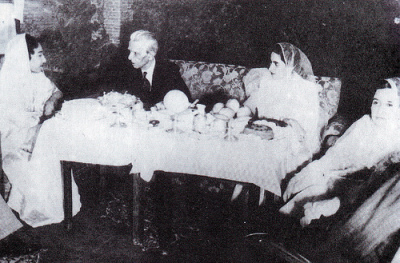How to install the app on iOS
Follow along with the video below to see how to install our site as a web app on your home screen.
Note: This feature may not be available in some browsers.
You are using an out of date browser. It may not display this or other websites correctly.
You should upgrade or use an alternative browser.
You should upgrade or use an alternative browser.
Rare Pictures of Quaid-e-Azam.
- Thread starter pkpatriotic
- Start date
ghazi52
PDF THINK TANK: ANALYST

- Joined
- Mar 21, 2007
- Messages
- 104,271
- Reaction score
- 106
- Country
- Location
June 3rd, 1947: The Partition agreement is being discussed among three parties.
Clockwise from left: Sardar Abdur Rab Nishtar, Baldev Singh, Acharya Kirpalani, Vallabhai Patel, Nehru, Mountbatten, Quaid and Liaquat Ali Khan. Lord Ismay is seated at the back.

1947: Quaid-e-Azam Muhammad Ali Jinnah's Last Press Conference at Delhi before leaving for new born Pakistan.

August 14, 1947: Governor of new born Pakistan Quaid-e-Azam Muhammad Ali Jinnah with Louis Mountbatten, Edwina Mountbatten and Fatima Jinnah

Clockwise from left: Sardar Abdur Rab Nishtar, Baldev Singh, Acharya Kirpalani, Vallabhai Patel, Nehru, Mountbatten, Quaid and Liaquat Ali Khan. Lord Ismay is seated at the back.

1947: Quaid-e-Azam Muhammad Ali Jinnah's Last Press Conference at Delhi before leaving for new born Pakistan.

August 14, 1947: Governor of new born Pakistan Quaid-e-Azam Muhammad Ali Jinnah with Louis Mountbatten, Edwina Mountbatten and Fatima Jinnah

ghazi52
PDF THINK TANK: ANALYST

- Joined
- Mar 21, 2007
- Messages
- 104,271
- Reaction score
- 106
- Country
- Location
نواب محمد خان جوگیزئی
پاکستان



Simla Conference 1945 was the occasion when the road map of division of India was agreed with the British Raj.
There were only three claimants .
Jinnah for a Muslim homeland Pakistan.
Sardar Tara Singh (Seen on the side of Jinnah) for a Sikh Homeland Khalistan.
Nehru for a secular India and he was joined and supported by Khan Abdul Ghaffar Khan.

پاکستان



Simla Conference 1945 was the occasion when the road map of division of India was agreed with the British Raj.
There were only three claimants .
Jinnah for a Muslim homeland Pakistan.
Sardar Tara Singh (Seen on the side of Jinnah) for a Sikh Homeland Khalistan.
Nehru for a secular India and he was joined and supported by Khan Abdul Ghaffar Khan.

Pakistansdefender
SENIOR MEMBER

- Joined
- Sep 22, 2016
- Messages
- 3,770
- Reaction score
- 1
- Country
- Location
What a great nation we used to be....
And these current politicians and military dictators have reduced us into nothing.
And these current politicians and military dictators have reduced us into nothing.
ghazi52
PDF THINK TANK: ANALYST

- Joined
- Mar 21, 2007
- Messages
- 104,271
- Reaction score
- 106
- Country
- Location
ghazi52
PDF THINK TANK: ANALYST

- Joined
- Mar 21, 2007
- Messages
- 104,271
- Reaction score
- 106
- Country
- Location
Quaid-i-Azam Muhammad Ali Jinnah with members of the Central Legislative Assembly for the Muslim League in Delhi, 1946. Seated second and third from the left is Jogendra Nath Mandal and Khawaja Nazimuddin; seated third from the right is Sir Yamin Khan. Mohammad Amir Ahmed Khan, the Raja of Mahmudabad, stands on the extreme left; Nawabzada Liaquat Ali Khan and I.I. Chundrigar are on the extreme right in the second row. Sardar Abdul Rab Nishtar on extreme left in 2nd row standing.


ghazi52
PDF THINK TANK: ANALYST

- Joined
- Mar 21, 2007
- Messages
- 104,271
- Reaction score
- 106
- Country
- Location
The first cabinet of Pakistani is formed on August 15, 1947 at Governor-General House, Karachi. Members include, from left to right, Mir Fazlur Rahman, Malik Ghulam Muhammad, Nawabzada Liaquat Ali Khan, Quaid-i-Azam Mohammad Ali Jinnah, I.I. Chundrigar, Sardar Abdur Rab Nishtar and Abdus Sattar Pirzada.


Similar threads
- Replies
- 4
- Views
- 874
- Replies
- 1
- Views
- 2K
- Replies
- 0
- Views
- 724
- Replies
- 99
- Views
- 14K












